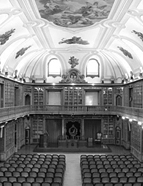

The editions of Vida do Infante D. Duarte [ Life ofInfante D. Duarte] by André de Resende (1789), Soldado Prático [Practical Soldier] by Diogo do Couto (1790) and the Colecção de Notícias para a História e Geografia das Nações Ultramarinas [Collection of News for the History and Geography of the Overseas Nations] (5 vols. initiated in 1812, the publication of which extended up to 1839) were equally relevant. By establishing this corpus of Portuguese historical sources, to which the work of registering and inventorying unknown or barely known documents in the archives and libraries was evidently related, the ACL demonstrated its clear priority to reconstruct and enhance the heritage of the country.
Indeed, without an inventory of archives and the publication of sources, the historian's occupation would not be possible. This is the third dimension that should be retained in this appraisal of the activities directly provided by the ACL during the first phase of its institutional existence, and one that represents one of the most important periods for an understanding of the contribution of the ACL to the construction of history as an academic discipline in our country.
All the authors who participated in the mission of the ACL of conducting a survey on the sources in the kingdom's registry offices and libraries also published accounts of their archival incursions in the collection Memórias de Literatura Portuguesa, of which eight volumes were published between 1792 and 1814. This collection, whose title is expressly identified as a reference to Portuguese language and history, is the main repository of the historiographical work of the ACL members throughout the period under review. Examples include the publication of a memoir on the unpublished chronicle of the conquest of the Algarve, found by Friar Joaquim de Santo Agostinho (Memórias de Literatura Portuguesa, Volume I, 1792, pp. 74-97), the detailed description by the same author of the manuscript codices of the Alcobaça Monastery, in which he corrects the errors of earlier inventories (ibid, Volume V, 1793, pp. 297-362), the brief news piece by Friar Joaquim Forjaz on the discovery of the unpublished memoirs of Diogo do Couto in the Convent of Graça (ibid, Book I, 1792, pp. 339-343), and also the several memoirs by João Pedro Ribeiro on the historical sources of the ordinances and Portuguese civil and canon law. The memoirs of António Caetano do Amaral on the history of legislation and customs in Portugal are equally relevant.
